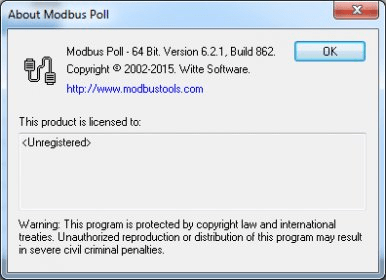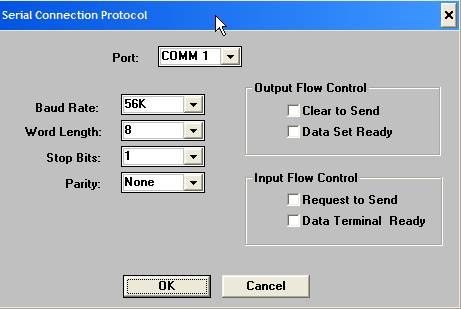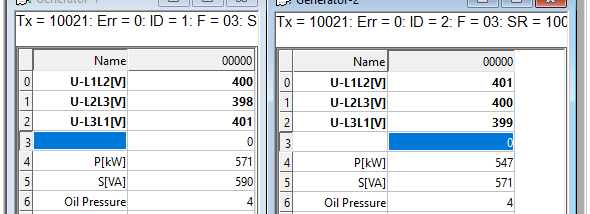

- #Modbus poll 7.0.0 registration key Patch#
- #Modbus poll 7.0.0 registration key verification#
- #Modbus poll 7.0.0 registration key code#
The unofficial vscode-phpmd (aka PHP Mess Detector) extension before 1.3.0 for Visual Studio Code allows remote attackers to execute arbitrary code via a crafted mand value in a workspace folder. Simple_food_website_project - simple_food_websiteĪ SQL INJECTION vulnerability in Sourcecodester Simple Food Website 1.0 allows a remote attacker to Bypass Authentication and become Admin. In RDoc 3.11 through 6.x before 6.3.1, as distributed with Ruby through 3.0.1, it is possible to execute arbitrary code via | and tags in a filename. Replay-sorcery-kms in Replay Sorcery 0.6.0 allows a local attacker to gain root privileges via a symlink attack on /tmp/replay-sorcery or /tmp/replay-sorcery/device.sock. Sourcecodester Phone Shop Sales Managements System version 1.0 suffers from a remote SQL injection vulnerability that allows for authentication bypass. Phone_shop_sales_managements_system_project - phone_shop_sales_managements_system Online Pet Shop We App 1.0 is vulnerable to Union SQL Injection in products.php (aka p=products) via the c or s parameter.

Online_pet_shop_we_app_project - online_pet_shop_we_app SQL Injection vulnerability in NukeViet CMS module Shops 4.0.29 and 4.3 via the (1) listid parameter in detail.php and the (2) group_price or groupid parameters in search_result.php. SQL Injection vulnerability in NukeViet CMS 4.0.10 - 4.3.07 via:the topicsid parameter in modules/news/admin/addtotopics.php. SQL Injection vulnerability in Metinfo 6.1.3 via a dosafety_emailadd action in basic.php. Learning_management_system_project - learning_management_systemĪrbitrary file upload vulnerability in SourceCodester Learning Management System v 1.0 allows attackers to execute arbitrary code, via the file upload to \lms\student_avatar.php. By sending specially-crafted data, an attacker could exploit this vulnerability to execute arbitrary code on the system. IBM Partner Engagement Manager 2.0 could allow a remote attacker to execute arbitrary code on the system, caused by an unsafe deserialization flaw. IBM AIX 7.1, 7.2, and VIOS 3.1 could allow a local user to exploit a vulnerability in Korn Shell (ksh) to gain root privileges. There is a Memory Buffer Improper Operation Limit Vulnerability in Huawei Smartphone.Successful exploitation of this vulnerability may cause malicious code to be executed. There is a Memory Buffer Improper Operation Limit Vulnerability in Huawei Smartphone.Successful exploitation of this vulnerability may cause certain codes to be executed. There is a Permission Control Vulnerability in Huawei Smartphone.Successful exploitation of this vulnerability may cause certain codes to be executed. There is an Integer Overflow Vulnerability in Huawei Smartphone.Successful exploitation of this vulnerability may cause certain codes to be executed. There is an Improper Control of Dynamically Managing Code Resources Vulnerability in Huawei Smartphone.Successful exploitation of this vulnerability may allow attempts to remotely execute commands.

#Modbus poll 7.0.0 registration key verification#
There is an Input Verification Vulnerability in Huawei Smartphone.Successful exploitation of this vulnerability may cause code injection. SQL Injection Vulnerability in ECTouch v2 via the shop page in index.php. Please note that some of the information in the bulletin is compiled from external, open-source reports and is not a direct result of CISA analysis.īasic_shopping_cart_project - basic_shopping_cartĪ SQL Injection vulnerability in Sourcecodester Basic Shopping Cart 1.0 allows a remote attacker to Bypass Authentication and become Admin.
#Modbus poll 7.0.0 registration key Patch#
Patch information is provided when available. This information may include identifying information, values, definitions, and related links. Low: vulnerabilities with a CVSS base score of 0.0–3.9Įntries may include additional information provided by organizations and efforts sponsored by CISA.Medium: vulnerabilities with a CVSS base score of 4.0–6.9.High: vulnerabilities with a CVSS base score of 7.0–10.0.

The division of high, medium, and low severities correspond to the following scores: Vulnerabilities are based on the Common Vulnerabilities and Exposures (CVE) vulnerability naming standard and are organized according to severity, determined by the Common Vulnerability Scoring System (CVSS) standard. Please visit NVD for updated vulnerability entries, which include CVSS scores once they are available. In some cases, the vulnerabilities in the bulletin may not yet have assigned CVSS scores. The CISA Vulnerability Bulletin provides a summary of new vulnerabilities that have been recorded by the National Institute of Standards and Technology (NIST) National Vulnerability Database (NVD) in the past week.


 0 kommentar(er)
0 kommentar(er)
